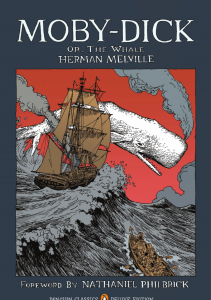
It’s been over 150 years since Moby-Dick was first published in 1851, since then the story of Ishmael and the White Whale has seeped into popular culture via every medium on earth. From Films, television, radio, theater, comics and even an entire metal album called Leviathan by the band Mastodon.
The Enduring Legacy of Moby-Dick: From Scathing Reviews to Pop Culture Phenomenon.
Despite being arguably the greatest American novel ever written, Mody-Dick was far from an instant classic, in fact, it received scathing reviews upon its initial publication. Melville was considered an accomplished author after his popular earlier works such as Typee and Omoo but Melville was shocked when what he considered to be his Magnum Opus was poorly received. No one wanted to read this great metaphor for God, the universe, science and good and evil. In England the book was even censored due to its “sacrilegious” passages. Melville it seems, was ahead of his time. By the time of his death in 1891, Melville and his works were almost completely forgotten. Then came World War I…
Moby-Dick became relevant in the years after WWI. It’s not hard to understand why a book that explores huge subjects like good, evil, destruction, loss, philosophy and madness appealed to people who had so recently watched the world go up in flames. The book garnered more and more attention and praise and once again felt relevant when America entered the Second World War. The rest as they say is history but of course Melville was long dead before he got the attention he deserved.
Enough about history though, lets jump into the book itself. This leviathan of a novel is told from the perspective of Ishmael as he recounts to the reader his adventure and the disaster that befell him and his crew mates at sea. In a stellar opening, Ishmael explains the reason he went to sea in the first place:
A famous opening paragraph from Moby-Dick by Herman Melville
“Whenever I find myself growing grim about the mouth; whenever it is a damp, drizzly November in my soul; whenever I find myself involuntarily pausing before coffin warehouses, and bringing up the rear of every funeral I meet; and especially whenever my hypos get such an upper hand of me, that it requires a strong moral principle to prevent me from deliberately stepping into the street, and methodically knocking people’s hats off — then, I account it high time to get to sea as soon as I can.”
Whilst looking for a ship to sign on to, Ishmael meets a heavily tattooed Polynesian harpooner named Queequeg. The two quickly become friends and decide to both work on the whaling ship, The Pequod, which is due to set sail within a few days. Strangely the ships captain, Captain Ahab is never seen on the ship until the moment it departs. The only excuse given for his absence is that he is unwell and recovering in his cabin. Ishmael and Queequeg meet some of their fellow crew mates including the serious but sincere Starbuck (after whom Starbucks coffee was named) and the happy-go-lucky Stubb.
Finally the Pequod sets sail and after a few days at sea, Captain Ahab finally appears on the quarter deck. He is described as an imposing, frightening figure whose haunted visage sends shivers over Ishmael. He delivers a speech to the crew and tells them that the real goal of their voyage is to find and kill the infamous white whale Moby-Dick, who crippled Ahab by taking his leg. Although by the events of Moby-Dick Ahab is obsessed with vengeance, it is made clear by characters who have known him that he is a great sailor, an even better captain and at heart a good man.
A Deep Dive into the World of Whaling and Philosophy in Moby-Dick
For the next 500 pages or so, Ishmael fills us in on what a life at sea on a whaling boat is like and explores ideas and philosophies with either us the reader or his crew mates. It could be argued that very little happens in between setting sail and the final showdown with Moby-Dick but then in a way that’s the point. If you’re expecting a swashbuckling adventure at sea then you’re going to be disappointed. That said however, I found Melville’s detailed writing of whaling to be genuinely interesting and by the end of the book I certainly felt I’d learned something. The detail also helps one form a picture in their mind of life aboard the ship and helps immerse oneself to the point where you feel as though you were there. Melville’s philosophies, as projected through Ishmael, Ahab and the crew is also incredibly interesting. Oftentimes Ishmael will reflect on his ideas and theories as he researches whales and whaling over the course of the voyage. These parts in particular show Melville’s skill as a writer as these often big and complicated ideas and concepts discussed by Ishmael never feel bloated, intimidating or self absorbed. Ishmael is just a simple young man pondering the world and its workings, his ideas and theories feel like the kind of conversations you might have with a mate at the pub or with a teacher you got on well with at school. It never feels like Melville is showing off or trying to preach to you, rather just giving you food for thought.
When discussing the philosophies and themes in Moby-Dick the most obvious to bring up is the contrasts between Ishmael and Captain Ahab. Ishmael is a humble but knowledge hungry man who accepts that no matter how hard you try, there are just somethings in life you can’t control and have to accept. This quote from Ishmael sums him up perfectly:
“Who ain’t a slave?…However they may thump and punch me about…everybody else is one way or other served much the same way.” – Ishmael.
In contrast to Ishmael we have Ahab. Ahab seems unable to accept the fact that life is full of unexplainable pain and injustice and refuses to accept the hand he’s dealt. To him, Moby-Dick symbolizes all the injustice in the world and sometimes even God Himself. Ahab refuses to be a victim of fate and is utterly dedicated to living by his own rules, even if it kills him. This quote best sums up Ahab:
“Talk not to me of blasphemy, man. I’d strike the sun if it insulted me.”- Ahab.
Put these quotes together and it’s easy to see that Ahab and Ishmael are complete opposites of one another. Speaking of Moby representing the evil in the world, some sailors Ahab encounters along his voyage, report seeing Moby in multiple places at once. The whale represents different things to different characters. To Ahab he’s the embodiment of all the pain and evil in the world whilst it could be argued that to Ishmael, he’s just an old, white, whale. This is certainly true of another ships captain Ahab encounters who has also lost a limb to the whale but harbors no feelings of vengeance and simply accepts it.
The Tragic End of Ahab’s Hunt for Moby-Dick: An Epic Confrontation at Sea
After much sailing, whaling and occasionally encountering other ships, Ahab hears Moby is close and starts frantically searching. The closer he gets to Moby, the more tyrannical and monomaniacal he becomes. The Pequod encounters the Rachel who’s captain begs Ahab to help search for his son who fell overboard. So close to his goal, Ahab denies the man and continues his hunt. Eventually he finds Moby and chases the whale for three days. On the third day, after an epic confrontation, Moby greatly damages the Pequod and sinks it. In his small whaling boat Ahab delivers a severe wound to Moby with his harpoon but gets caught in the line attached to the harpoon and is dragged to his doom along with Moby. The Pequod sinks along with the rest of the crew and in the end the only survivor is Ishmael who is found and rescued by the Rachel.
In the end, it doesn’t matter who you side with. Whether you believe, like Ahab, that the world is run by a God who just doesn’t seem to give a shit about us or whether, like Ishmael, you think the universe is just a load of atoms randomly colliding, you have to admit that both are fairly depressing and empty views. Despair not though, all you need to do is find your own version of the Rachel to keep you afloat. Whether your Rachel is love, friendship, or even books doesn’t matter. Long as you stay afloat.
In summary I personally found Moby Dick to be an excellent although sometimes difficult read. Persevere though and you will be rewarded ten fold. This definitely isn’t a book for light readers but if you’re interested I say give it a go. Don’t be put off by its great length either. Reading isn’t about the destination but rather the journey itself.
As for the White Whale we never learn it’s ultimate fate. Did Ahab deliver a killing blow or did the whale survive and still haunt the seas today? Who can say for sure? Though next time you find yourself looking out to sea, keep an eye out for Moby and spare a thought for Captain Ahab and his crew.










